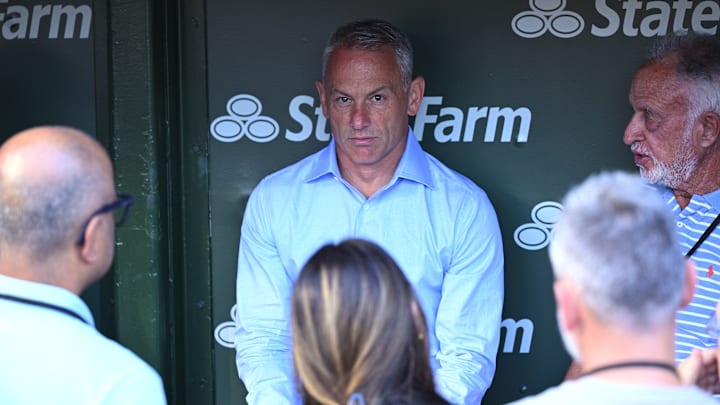If you were underwhelmed by last week's trade deadline as a Milwaukee Brewers fan, imagine what it must have felt like to be a fan of the Chicago Cubs. The Cubs, who have far more holes on their roster than the first-place Brewers, did make several trades ahead of last Thursday's deadline, but none were the needle-mover that Chicago fans expected. Rather, the Cubs' president of baseball operations, Jed Hoyer, and the rest of Chicago's front office decided to add two bullpen arms, a utility man, and a starting pitcher with a long history of injuries.
The most glaring need was in the rotation, where injuries to Justin Steele, Jameson Taillon, and Shota Imanaga have left the Cubs without a fully healthy starting staff for most of the season. While Imanaga has already returned and Taillon is set to return shortly, Steele is out for the season, and the Cubs needed another starter to add to the mix for the stretch run. Rather than part with significant prospect capital, Hoyer and company decided to buy low on Mike Soroka of the Washington Nationals.
Soroka certainly has some upside; he was an All-Star at 21 years old back in 2019, while pitching for the Atlanta Braves. However, since then, injuries have derailed Soroka's career, causing him to miss the entire 2021 and 2022 seasons and limiting him to just 15 total starts between 2023 and 2024. While 2025 had been the healthiest season for Soroka in six years, in his three starts prior to the Cubs acquiring him, his velocity had dipped, suggesting that the shoulder problems Soroka had previously experienced in his career may have returned.
Just two innings into his first start for the Cubs, the worst-case scenario for Hoyer and the Cubs' front office came true: Soroka had to leave the game with shoulder soreness.
Cubs trade for Mike Soroka immediately backfires in his first start for Chicago
There is absolutely nothing funny about Soroka's injury. He is a talented arm who has unfortunately not been given the opportunity to reach his full potential due to injury after injury. Baseball fans in general should be wishing for a speedy recovery for Soroka, who after countless recovery processes, is more than deserving of a fully healthy season.
However, there is something very funny about the Cubs trade deadline strategy. The organization went from saying that they were "all in" on acquiring a frontline starter to buying low on a back-end starter to having that starter go on the injured list just two innings into his Cubs tenure. They knew that Soroka was losing velocity in his most recent starts, but decided to part with their No. 13 prospect, Ronny Cruz, and their No. 14 prospect, Christian Franklin, to acquire him nonetheless.
Not only that, but the Cubs, who pushed for a rescheduling of their June 18 rainout with the Brewers to occur as part of a five-game series with Milwaukee from August 18-21, remain in desperate need of a reliable innings eater. With five games in four days against the Brewers in the midst of a 13-day stretch without a day off, the Cubs will have to get creative with how they use their pitching staff in the coming weeks.
It's still up in the air whether or not Soroka will return before the end of the season, but given the nature of the injury and his history with similar shoulder problems, it's unlikely that he will have a major impact on the Cubs' postseason run.
Andrew Kittredge allows costly go-ahead HR in third appearance with the Cubs
The Soroka trade isn't the only deadline deal that is already aging poorly for the Cubs' front office. The team also acquired Andrew Kittredge, a veteran reliever, from the Baltimore Orioles ahead of last week's trade deadline. The cost for Kittredge was the Cubs' No. 17 ranked prospect Wilfri De La Cruz.
To be fair, Kittredge made two scoreless appearances for the Cubs over the weekend, facing his former team and collecting three strikeouts in two innings of work. However, last night, with the Cubs locked into a 1-1 tie with their NL Central rivals, the Cincinnati Reds, Kittredge was called upon to relieve Imanaga of his duties with one out in the top of the 7th.
Kittredge proceeded to walk the first batter he faced, allow a single to the second, and then a three-run homer to Spencer Steer. The next two batters reached base as well, and a subsequent sacrifice fly from Santiago Espinal made it a 5-1 lead for the Reds. Still with one out to get, Kittredge was replaced by fellow trade deadline acquisition Taylor Rogers. All in all, Kittredge allowed four earned runs while collecting just one out in his third appearance for the Cubs, adding difficulty to Craig Counsell's already difficult late-game bullpen decisions.
It's still very early; less than a week has passed since the trade deadline. However, with the Cubs failing to acquire a frontline starter and then losing their starting pitching acquisition to a potentially season-ending injury while one of their bullpen additions struggles to begin his Cubs' tenure, things aren't looking great for the recently extended Hoyer and the rest of the Cubs' front office.
